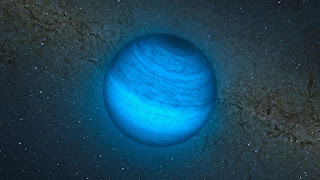The idea of a rogue planet seemed frightening as a child, but as I grew older is seemed more and more implausible. What mechanism would cause a planet to break free of it's stellar system? Sure, in the vastness of our universe there must be some rogue planets, but surely there couldn't be many?

Well it turns out that not only have astronomers sighted a rogue planet, but that many models of our universe predict that there are twice as many rogue planets than there are main-sequence stars. Urk.
Astronomers have discovered a potential "rogue" alien planet wandering alone just 100 light-years from Earth, suggesting that such starless worlds may be extremely common across the galaxy.Rogue planets are Nature's way of asking, "How's that space program coming along?"
The free-floating object, called CFBDSIR2149, is likely a gas giant planet four to seven times more massive than Jupiter, scientists say in a new study unveiled today (Nov. 14). The planet cruises unbound through space relatively close to Earth (in astronomical terms; the Milky Way galaxy is 100,000 light-years wide), perhaps after being booted from its own solar system.

No comments:
Post a Comment